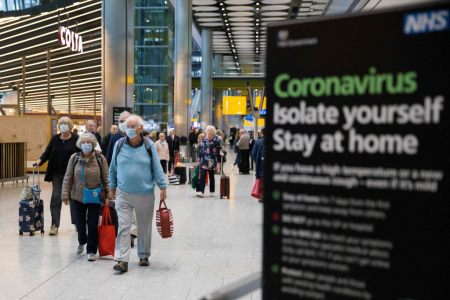Pew: Most white evangelicals don't think COVID-19 poses a major threat to Americans' health

White evangelicals are less likely than most other groups to say COVID-19 poses a major threat to the health of the U.S. population, according to a new study released by the Pew Research Center.
According to the Pew survey gathered as part of the Election News Pathways project, only about a third of white evangelical Protestants (32%) say the virus poses a major threat to the health of the U.S. population. Additionally, white evangelical Protestants (76%) are the most likely to think the media has made a bigger deal of the coronavirus crisis than is warranted.
While most white evangelicals (64%) believe COVID-19 poses a major threat to the U.S. economy, they are less likely than most other groups to say the virus poses a major threat to day-to-day life in their local communities.
Just over a quarter of white evangelicals (26%) see a major danger to day-to-day life in their community, on par with white Protestants who are not evangelical (27%) and white Catholics (31%), but lower than other religiously affiliated groups.
The Pew survey of 8,914 U.S. adults was conducted March 10-16, after the U.S. recorded its first coronavirus death. On March 13, President Donald Trump declared a national state of emergency due to the rapid spread of the virus.
Pew also found that around three-quarters of white evangelicals (77%) say they are at least somewhat confident that Trump is doing a good job responding to the outbreak, including roughly half who say they are very confident. Majorities of white evangelicals also say Trump has assessed the risks of the situation correctly (64%).
Notably, a majority of U.S. adults overall say the news media exaggerated the risks posed by COVID-19, including 67% of white Protestants who are not evangelical, 63% of white Catholics and 60% of the religiously unaffiliated.
There are now more than 85,000 cases of the coronavirus across the U.S., and fatalities have reached 1,296. Wednesday marked the deadliest day for reporting of U.S. coronavirus cases of coronavirus, with 223 deaths reported that day alone.
A number of pastors and Christian leaders have weighed in on how believers should respond to the pandemic.
David Jeremiah, pastor of Shadow Mountain Community Church in El Cajon, California, stressed the importance of being informed but advised listening to only one, condensed COVID-19 report a day instead of inundating oneself with negativity.
“This is not the end of the world. Step back, take a deep breath, and get into the Word of God and be reminded that God is in control,” he said.
“I want to encourage everybody to not let fear become a greater problem than the coronavirus, but trust God. The coronavirus is not a big deal to God. He’s able to control this and take in, and we’re going to come through this better than we were when we came in. In the meantime, we have to be calm and ask Him to give us peace.”
Popular pastor and author Max Lucado of Oak Hills Church in San Antonio, Texas, told The Christian Post that every Christian would do well to ask, “‘Lord, what are you saying to me during this crisis?”
“God is talking to the world through the global pandemic,” he said. “I believe His message is both personal and global. ... It could be that some of us need to hear the Lord saying, ‘Quit making an idol out of these sources of pleasure. Come to me for fulfillment.”
“Go to the Lord, ask what He’s saying, and then say, ‘How can we be used by you? How can we serve others?’" he advised. "It’s not easy because of social distancing. But we can text and call people, drop gifts off for someone, we can get creative, especially with the vulnerable.”
Southern Baptist Convention President J.D. Greear advised Christians to care for the elderly, vulnerable, and hourly workers; buy gift cards from service places; support healthcare workers; and participate in church ministries during this time.
“Proclaim hope,” he stressed. “This is a time where God is shaking the foundations and we have a unique moment to step in and show Gospel hope, that when everything else around us turns into shifting sands, we are able to say, ‘Christ is the solid rock and all other ground is sinking sand.’”
Greear suggested using this season to develop good habits, encouraging listeners to view it as an “extended Sabbath.”
“Don’t just make it through this time. Redeem this time. Don’t waste your quarantine,” he said. “We know that God does a lot of His greatest works in times when there isn’t a lot of activity.”





















